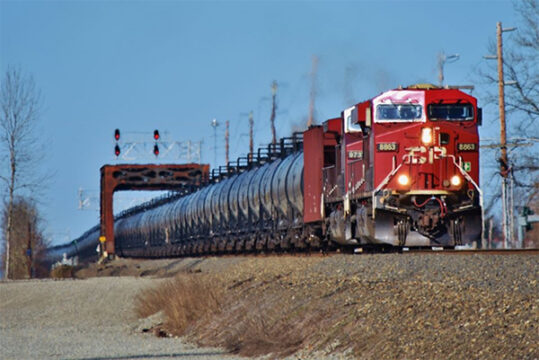
We begin the second week of February with Transport Canada taking center stage on the regulatory scene in a major action directed at addressing train operating safety following a pair of recent oil train derailments. Find the details on that below. A variety of other and somewhat less minor—but still interesting–actions rounded out the week’s happenings. Also; in lighter news, the coming week will also feature the Valentine’s Day holiday, so be sure and stop to smell the roses and maybe enjoy a bite of chocolate! See all the news right here:
Transport Canada
In a major emergency action following the second recent derailment of an oil train in Saskatchewan, the agency issued a Ministerial Order directing subject railway operating companies in Canada to immediately (as of February 6th) slow all trains transporting at least twenty cars bearing dangerous goods (also known as “Key Trains”) to no more than 25 miles per hour. This order is place until March 9th and may be extended. It applies nationwide in Canada. The agency contends this will increase safety while it investigates the cause of the recent accidents. Slowing trains decreases overall system velocity and has the effect of draining operating capacity from the infrastructure, since more crews, locomotives, and cars must be used to offer the same service levels that existed prior to the slow order. See the order here
The agency also issued guidance eon the classification, handling, and transport of “Produced Water.” This water is a by-product of oil and gas extraction and as such can bear chemical traits that depending on their constituents, could render the water hazardous. See the new guidance here
FMCSA
The agency is amending its December 8, 2016, final rule, ‘‘Minimum Training Requirements for Entry-Level Commercial Motor Vehicle Operators’’ (ELDT final rule), by extending the compliance date for the rule from February 7, 2020, to February 7, 2022. This action will provide FMCSA additional time to complete development of the Training Provider Registry (TPR). See the extension here
OSHA
The agency published a renewal for an ICR related to employee illness and injury data collection requirements. Employers are required to collect and make available such data on request of the agency in order to assist OSHA in developing turned data on various types of occupational risks. See the renewal here
In a second ICR renewal, the agency reauthorized its collection of data in reference to the handling of asbestos in general industry. Asbestos is a material known to have significant health risks. See the ICR here
Labelmaster is a full-service provider of products, shipping and training software, and professional consulting services to assist the DG and HS&E professional in complying with national and international regulations. See our full line of solutions at www.labelmaster.com


